The Electronic Intifada 25 January 2005
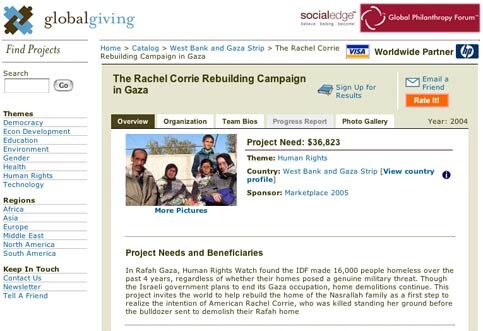
Redwood City, CA — The Rachel Corrie Rebuilding Campaign in Gaza has been nominated for a GlobalGiving.com competition. Through January 27th, at www.globalgiving.com/cb/gpf/pr/1000/proj929a.html, people throughout the world can vote online and rate the entries they deem best.
The Gaza project is one of only two in the Human Rights category. 15 semifinalists chosen through open ratings will present their work at the Global Philanthropy Forum on Borderless Giving in March, where three winners will share $100,000 in project grants.
The Rachel Corrie Rebuilding Campaign, a project of The Rebuilding Alliance, starts by building for the Nasrallahs, the family that Rachel Corrie stood to safeguard when she was killed by the Caterpillar D9R bulldozer sent to demolish their home.
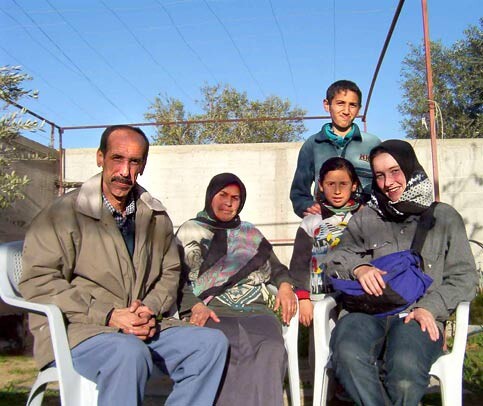
Rachel Corrie with Dr. Samir’s family.
The Israeli army has demolished more than 2400 homes in Gaza since September 2000. It demolished more than 15,000 homes since 1967 — and entire villages in 1948. This is not a natural disaster. Dr. Michael Marten in London put it this way: “Houses are demolished because of a thought-through and deliberate policy by the Israeli government, one of the closest allies of the US and the UK.” He continued, “Building houses, laudable as that is as a humanitarian act, does little to bring change without political understanding and knowledge.”
On Monday, Israel’s Ha’aretz newspaper published an article entitled, “Ya’alon Awaits Two Reports on House Demolitions.” In it, staff writer Amos Harel describes the Israeli Defense Force’s ongoing evaluation of the massive number of homes demolished in the Occupied Territories, especially Gaza. One report examines the effectiveness of destroying houses as a deterrent and includes an examination of military conduct in Gaza during major operations, such as May’s Operation Rainbow in Rafah. The other investigates the demolition of 25 homes in the Gaza town of Khan Younis, when the military order called for demolition of only two.
Harel writes, “In conversations with Ha’aretz, two officers involved in several Gaza operations paint a worrisome picture of unrestrained use of force, with authority to demolish homes residing in the hands of low-ranking officers.” But Harel states, “a comprehensive investigation of house demolition policy cannot focus only on them. It touches on the entire senior wartime command.”
Especially harrowing is Harel’s conclusion, which speculates about the motivation for these reviews, just as the Knesset is weighing Gaza redeployment: “One goal would be to improve the defense of the Philadelphi Route, which Israel plans to hold even after disengagement. The Southern Command has presented a plan including the alternative of creating a 300-meter-wide barrier zone around the route. This would involve demolishing hundreds more homes.”
So now we know. “Hundreds more homes” are at risk along the Philadelphi corridor in Rafah, Gaza — and their destruction will not be a natural disaster.
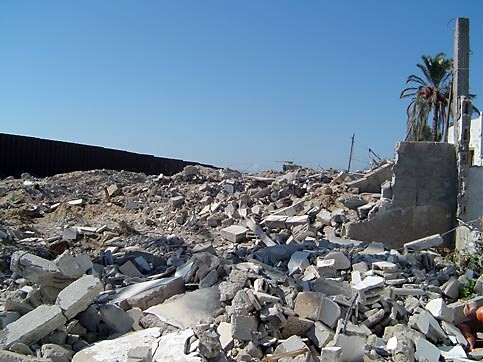
The Philadelphi Corridor in Rafah where 2,200 homes were demolished, regardless of whether the homes posed a genuine military threat.
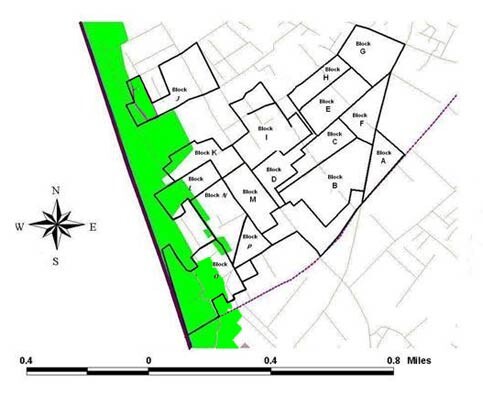
Adapted from a PCHR graphic, this map shows Rafah area demolitions (in green) up to mid-2004 for the Philadelphi Corridor.
So where does the Rachel Corrie Rebuilding Campaign in Gaza fit in? The Nasrallah family’s home was located on the Philadelphi corridor. For months after Rachel was killed, and long after the rest of the neighborhood was already pulverized, the Nasrallahs “protected their home with their bodies by living in it,” (their words) sure that they would be left alone because they had done nothing wrong. On October 17, 2003, Caterpillar D-9 bulldozers tore deep trenches along three sides of the home, cutting off water, electricity, and sewage. “At that time we were forced to leave the home because we cannot continue our life there, and it was the most sad day of our life to leave our home in this situation,” wrote Khaled Nasrallah. “We remembered our grandfathers and our parents when they were forced to leave their lands and homes.”
The bulldozers came back to finish the job in January, 2004, burying the duplex home beneath the sand. Since then, Dr. Samir Nasrallah (the pharmacist brother) and his family have moved six times, while Khaled Nasrallah (the accountant brother) and his family have moved three times. Operation Rainbow in May destroyed Dr. Samir Nasrallah’s rental apartment and the rest of the homes in their neighborhood, sometimes with the families staying inside until the last possible moment.
The Rebuilding Alliance helps Palestinian families rebuild their demolished homes on the land they own. But not this time. If you step out on the sand of the Philadelphi corridor, even just to take a photo, the Israeli snipers shoot at you. So not even a flower is planted where Rachel was killed, or where the neighbor lady was shot while drinking her afternoon tea. Because it is too dangerous to build there, The Rebuilding Alliance is helping the family buy land away from Gaza’s border zones for a home in a safer place.

Rachel’s parents, Craig & Cindy Corrie, visiting TRA-funded building of a kindergarten in the West Bank.
Bringing light to this place means restoring a family’s home. Bringing light to this place means informing Americans about the devastating impact of the occupation in Gaza, and calling for it to end, so that hopes for a just peace may eventually be realized. Bringing light to this place means asking people of good will throughout the world to contact their representatives and to require an end to Israel’s policy of demolishing Palestinian homes. When an American Senator or Congressperson calls the Israeli Embassy, they listen.
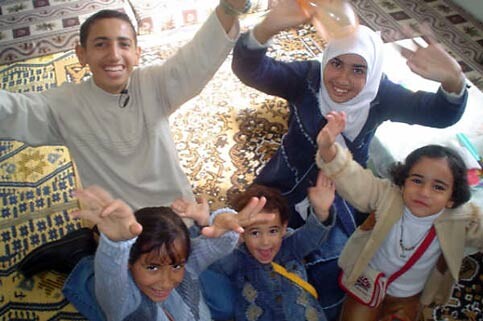
The Nasrallah cousins celebrating the Eid al-Fitr holiday together. Two Nasrallah brothers and their families lived in the original duplex. The Rebuilding Alliance project will bring the families back together again.
The Rebuilding Alliance hopes this Campaign will touch the hearts of readers and move them to take their own small step — one that may raise awareness in their own circles of influence. Help us prevent the demolition of hundreds more homes in Rafah and reaffirm the right of all children to live safely and peacefully in their own homes.
To join the effort and to rate the Rachel Corrie Rebuilding Campaign in Gaza, go to www.globalgiving.com/cb/gpf/pr/1000/proj929a.html.
Read more about the project and when ready, click on the “Rate It” button. “10” is the highest score and means “fantastic, great, high impact.” But rating the project or even winning the contest won’t be enough to achieve that “high impact goal.” Your action, in concert with all who would build and not destroy — that’s what really counts. When you are ready, begin.
Related Links
Donna Baranski-Walker is the director of The Rebuilding Alliance, an American human rights action group that safeguards fair housing rights in regions of conflict by helping people work together to rebuild homes and schools. Initial efforts focus on the West Bank, Gaza, and Jerusalem with a strategy that safeguards families, homes, and schools and builds momentum for a just peace by (1) strengthening fair housing rights, (2) bringing people together locally to build and not destroy, and (3) raising local and international awareness and consensus to support these efforts. Donna holds a B.S. in engineering from Massachusetts Institute of Technology and an M.S. from the University of Hawaii. She is also president of the Woodside/Portola Valley Rotary Club. She began learning about Middle East peacemaking in 1996 when her proposal to create an education development project in the region led to visits with teachers and principals. The proposal became the basis for the World Bank’s WorldLink program in the region. To comment on this article, please join the Rebuilding Alliance community bulletin board at www.RebuildingAlliance.org/phpBB2f. To read the Nasrallah family’s weblog go to www.RebuildingAlliance.org.

